Site Search
- resource provided by the Forum Network Knowledgebase.
Search Tip: Search with " " to find exact matches.
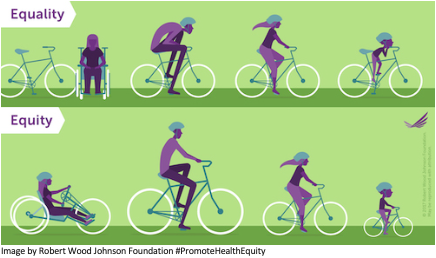
These articles are curated from news sources, philanthropic-focused publications, philanthropy serving organizations, and other places found on the internet. We encourage philanthropic organizations to read, share, and use the strategies suggested in these articles for your own diversity, equity, and inclusion learning journey. If there are others that you feel we should include, please contact us.
Chronicle of Philanthropy: Philanthropy Pours More Money Into Advancing Economic Wealth of Latinos (10/13/2022)
ABC News: Two New Jersey towns illustrate the race gap in the COVID pandemic (5/13/2022)
Chronicle of Philanthropy: General Operating Support Is Vital to Advancing Equity, Strengthening Nonprofits, Say Leaders (4/18/2022)
MacArthur Foundation: Movement to End Philanthropy’s Complicity in Anti-Blackness (4/18/2022)
Chronicle of Philanthropy: Nearly 500 Foundation Leaders Unite to Push for More Support of Asian Americans (3/26/2021)
Chronicle of Philanthropy: As Violence Against Asian Americans Intensifies, the Moment for Philanthropy to Act Is Now (3/17/2021)
Chronicle of Philanthropy: How One Family Foundation is Evolving to Refocus on Racial Equity (3/16/2021)
HealthDay.com: Many Adults Do Not See Link Between Racism, Poorer Health (1/27/2021)
Stanford Social Innovation Review: How to Begin Considering a Gender Lens Investing Strategy (12/10/2020)
Nonprofit Quarterly: How to Welcome Native Leaders to the Philanthropic Sector (12/3/20)
Chronicle of Philanthropy: Opinion Piece: Diversity Mandates from Foundations Maki It Harder for Nonprofits to Do Their Jobs Well (12/2/2020)
Chronicle of Philanthropy: Invest in and Strengthen People of Color: A Corporate Grant Maker Explains How (11/17/2020)
Nonprofit Quarterly: White House Declares Ban on Federal Racial Equity Trainings (9/14/20)
Nonprofit Quarterly: White Supremacy: Call It By Name (9/14/2020)
Denver Post: How Donors Can Advance Racial Equity (9/14/2020)
ROI-NJ: NJ to recognize Juneteenth as official state holiday (9/11/2020)
Chronicle of Philanthropy: The 'Warping Effects' of Philanthropy (8/25/2020)
Chronicle of Philanthropy: Companies Lead Philanthropic Response to Calls for Racial Justice, but Will It Last? (8/25/2020)
Exponent Philanthropy: Moving Towards Racial Equity in Philanthropy: Introducing an Anti-Racist Intersectional Frame (8/25/2020)
Inside Philanthropy: “A Moment of Reckoning.” How Can Funders Support an Equitable and Inclusive Arts Sector? (7/16/2020)
Generocity: Uprising in Philadelphia: A to-do list for the next six months (7/9/2020)
Boston Globe: The Problem is White Supremacy (6/29/2020)
Inside Philanthropy: Amid Demands for Change, Here’s How Philanthropy Can Back Underfunded Black-Led Group (6/18/2020)
Nonprofit Quarterly: This Moment Shows Us Why Philanthropy Should Reinvent Itself by Gislaine Ngounou, of the Nellie Mae Education Foundation (6/17/2020)
Chronicle of Philanthropy: Who Holds Philanthropy Accountable for Racial Justice? by Lisa Pilar Cowan, vice president of Robert Sterling Clark Foundation (6/16/2020)
Creative New Jersey: Summary and resources from their statewide conversation on Racial Justice (6/10/2020)
Chronicle of Philanthropy: 64 Black Foundation Leaders Tell Philanthropy to Go Big in Response to Pandemic and Police Killings (6/10/2020)
Stanford Social Innovation Review: Mass Decarceration, COVID-19, and Justice in America by Deanna Van Buren co-founder of Designing Justice + Designing Spaces and F. Javier Torres-Campos, Thriving Cultures Program Director at Surdna Foundation (6/9/2020)
Communications Network: Crowdsourced Anti-Racism Resources and Tools
NonprofitAF.com: Privilege, power, and personal conflicts: The forces preventing change in nonprofit and philanthropy by Vu Le (6/8/2020)
Philanthropy Network Greater Philadelphia: Articles and Resources from the webinar: The Crisis of White Supremacy in America: What’s Philanthropy’s Role (6/4/2020)
Chronicle of Philanthropy: Dismantling Racism Might Require Philanthropy to Dismantle Itself by Lisa Pilar Cowan, vice president of the Robert Sterling Clark Foundation (6/2/2020)
Chronicle of Philanthropy: Why All Grantmakers Should Seek to Fix Democracy by Suzette Brooks Masters, senior strategist at the Center for Inclusion and Belonging at the American Immigration Council (6/2/2020)
Southern Poverty Law Center: Authoritarian State or Inclusive Democracy? 21 Things We Can Do Right Now by Eric K. Ward, Senior Fellow (6/1/2020)
Nonprofit Quarterly: Dear Philanthropy: These Are the Fires of Anti-Black Racism by Will Cordery of Leverage Philanthropic Partners LLC & Astraea Lesbian Foundation for Justice (6/1/2020)
NonprofitAF.com: Have nonprofit and philanthropy become the "white moderate" that Dr. King warned us about? by Vu Le (6/1/2020)
Library Journal: Books on Anti-Racism (5/31/2020)
Stanford Social Innovation Review: Overcoming the Racial Bias in Philanthropic Funding by Cheryl Dorsey, Peter Kim, Cora Daniels, Lyell Sakaue, & Britt Savage (5/4/2020)
Stanford Social Innovation Review: For a More Equitable America, Understand Race and Racism as Actions We Do and Can Undo by MarYam Hamedani, Hazel Rose Markus & Jeanne Tsai (5/1/2020)
Jacobin Magazine: The Perils of Liberal Philanthropy by Karen Ferguson (11/2018)
Smithsonian Magazine: The 1968 Kerner Commisssion Got It Right, But Nobody Listened by Alice George (3/1/2018)
Continuum Chart on Becoming an Anti-Racist Multicultural Organization by Crossroads Ministry (2013)
The Characteristics of White Supremacy Culture from Dismantling Racism: A Workbook for Social Change Groups (2001)
Resource Generation: Guidance for Giving to Black-led Organizations for Black Liberation (undated)
Prison Policy Initiative: Prison Gerrymandering Project how the Census Bureau counts people in prison (undated)
As we navigate today's challenges and opportunities, it's important that we continue to gather, exchange ideas, and move forward the causes we value. We all know how a single conversation can spark a big idea or inspire a new partnership.  That's why you won't want to miss our much-anticipated 2024 Spring Colloquium: Empowering the Future: Harnessing AI and Data for Philanthropic Social Impact - a must-attend gathering for every funder working in New Jersey. Join us for valuable insights and opportunities to connect with colleagues and passionate thought leaders who share your commitment to driving social change.
That's why you won't want to miss our much-anticipated 2024 Spring Colloquium: Empowering the Future: Harnessing AI and Data for Philanthropic Social Impact - a must-attend gathering for every funder working in New Jersey. Join us for valuable insights and opportunities to connect with colleagues and passionate thought leaders who share your commitment to driving social change.
I look forward to seeing you there and engaging in the vibrant discussions and community building opportunities that awaits us.
Thank you to the generosity of our sponsors: Signature Sponsor - PSE&G, Collaborator Sponsor - Wells Fargo, Connector Sponsors - Campbell Soup Company, Sixers Youth Foundation, and Robert Wood Johnson Foundation, and Exhibitor Sponsor - PKF O'Connor Davies. We couldn't do this without you.
We look forward to seeing you there!
Sincerely,
Theresa Jacks, President and CEO
Council of New Jersey Grantmakers
This advocacy and civic engagement toolkit is designed for private foundations that want to educate and encourage their grantees about getting involved in civic and policy activities to increase organizational capacity and impact. While its primary focus is on the grantmaking activity of foundations, the toolkit also addresses rules and guidance for policy involvement by foundation officials acting on behalf of their foundations.
This advocacy and civic engagement toolkit is designed for community and public foundations that want to educate and encourage their grantees about getting involved in civic and policy activities to increase organizational capacity and impact. While its primary focus is on the grantmaking activity of these foundations, the toolkit also addresses rules and guidance for policy involvement by foundation officials acting on behalf of their foundations.
Native Voices Rising is a joint research and re-granting project of Native Americans in Philanthropy and Common Counsel Foundation. This report focuses on the practices and challenges of community organizing and advocacy, focusing on the need for increased investment in and sustained support for American Indian, Alaska Native and Native Hawaiian communities.

Retributing Power by Simplifying and Streamlining Processes
Sisters of St. Joseph Health & Wellness Foundation
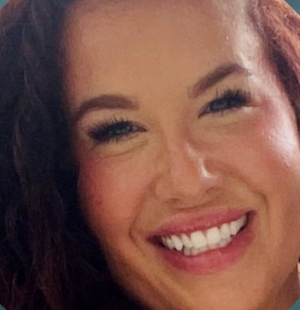 When Beth Collins joined the Sisters of St. Joseph Health and Wellness Foundation as the new Executive Director, she knew that the foundation could be doing more to support its nonprofit ecosystem. With a background in direct service, Beth remembered when she was on the other side of the funding relationship – sometimes spending hours writing lengthy application materials or digging up data to meet reporting requirements, all while juggling her never-ending to-do list. By aligning the values of Trust-Based Philanthropy to the virtues and mission of the Sisters of St. Joseph, she has catalyzed a shift toward redistributing power in its community partnerships.
When Beth Collins joined the Sisters of St. Joseph Health and Wellness Foundation as the new Executive Director, she knew that the foundation could be doing more to support its nonprofit ecosystem. With a background in direct service, Beth remembered when she was on the other side of the funding relationship – sometimes spending hours writing lengthy application materials or digging up data to meet reporting requirements, all while juggling her never-ending to-do list. By aligning the values of Trust-Based Philanthropy to the virtues and mission of the Sisters of St. Joseph, she has catalyzed a shift toward redistributing power in its community partnerships.
This power shift began when Beth started a conversation about values with the foundation board. By approaching the board with curiosity and bringing the voice of the community into the conversation, she set the tone for trust, openness, and an ongoing dialogue. The Foundation is now working toward fully embodying its values in its practices. The Sisters of St. Joseph have expanded their general operating support portfolio, shifted the bulk of the application process from applicants to the Foundation, replaced written reports with honest conversations, and created more opportunities for the public to provide feedback and engage in candid dialogue with the board. Focusing on only the essential information for applications and reporting has enabled staff to redirect their time and energy to develop wholehearted relationships with community partners. By starting with the why, Beth is leading the Foundation toward a clear vision for the how: “Trust Based Philanthropy is about humility – at Sisters of St. Joseph, we recognize that we are just one piece of the puzzle – and we are encouraging others to think outside of themselves.”
Offering Support Beyond the Check
Liberty Hill Foundation
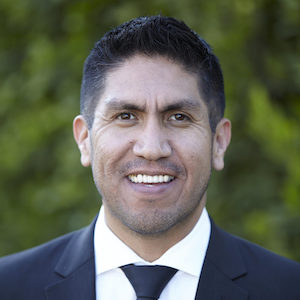 A community-funded foundation since day 1, Trust Based Philanthropy is at the core of the Liberty Hill Foundation. Centered on social justice campaigns, research, and policy initiatives designed to drive systemic change, Liberty Hill Foundation refers to itself as a "Laboratory for Social Change Philanthropy”. When Julio Marcial stepped into the role of Senior Vice President of Programs, he looked beyond the funding and considered the myriad of ways the foundation can support community partners beyond the check by connecting them to other funders and donors. As a member of several pooled funds in Los Angeles, Liberty Hill Foundation proactively seeks opportunities that will benefit their community partners. The Foundation has introduced many funders in their circle to Trust Based Philanthropy principles – this has sparked several conversations at other foundations serving Los Angeles county, several of which have since shifted their practices. Beyond private and public foundations, Marcial advocates for a push to Trust Based Philanthropy in California state funding agencies.
A community-funded foundation since day 1, Trust Based Philanthropy is at the core of the Liberty Hill Foundation. Centered on social justice campaigns, research, and policy initiatives designed to drive systemic change, Liberty Hill Foundation refers to itself as a "Laboratory for Social Change Philanthropy”. When Julio Marcial stepped into the role of Senior Vice President of Programs, he looked beyond the funding and considered the myriad of ways the foundation can support community partners beyond the check by connecting them to other funders and donors. As a member of several pooled funds in Los Angeles, Liberty Hill Foundation proactively seeks opportunities that will benefit their community partners. The Foundation has introduced many funders in their circle to Trust Based Philanthropy principles – this has sparked several conversations at other foundations serving Los Angeles county, several of which have since shifted their practices. Beyond private and public foundations, Marcial advocates for a push to Trust Based Philanthropy in California state funding agencies.
The Liberty Hill Foundation embraces itself as a fundraiser for its nonprofit partners and its responsibility for the Los Angeles community. The Foundation raises the funds and opens doors for nonprofits and then “steps out of the way,” says Julio. According to Julio, partnerships are the key to maximizing trust and impact in the community: “We can't do this without our partners, peers, and donors. We need to call each other out – and to call each other in.”
Leading with Trust, Transparency, and Responsiveness
Headwaters Foundation
 Headwaters Foundation is a health-conversion foundation working side by side with the community to achieve better outcomes towards a healthy and thriving Western Montana. Brenda Solorzano, CEO of Headwaters, has been at the helm of the foundation since its inception in 2017. With over 20 years of experience in traditional philanthropy, Brenda began asking big questions about standard philanthropic practices. Brenda is especially focused on tapping into the collective knowledge and experience of the community to create impactful systems. Early on in her tenure as CEO, Brenda shared her vision for Trust Based Philanthropy with the foundation’s board and they have supported her as she’s stewarded the foundation through its strategic planning process.
Headwaters Foundation is a health-conversion foundation working side by side with the community to achieve better outcomes towards a healthy and thriving Western Montana. Brenda Solorzano, CEO of Headwaters, has been at the helm of the foundation since its inception in 2017. With over 20 years of experience in traditional philanthropy, Brenda began asking big questions about standard philanthropic practices. Brenda is especially focused on tapping into the collective knowledge and experience of the community to create impactful systems. Early on in her tenure as CEO, Brenda shared her vision for Trust Based Philanthropy with the foundation’s board and they have supported her as she’s stewarded the foundation through its strategic planning process.
Community input and feedback was important to Brenda. With the board’s support, she took this a step further by engaging the community as co-creators and decision-makers. To accomplish this, Brenda invited 600 nonprofit representatives across the state to the table to share their thoughts. Brenda asked each person 2 questions: “If you were in my seat, what do you think the foundation should prioritize?” and “What’s the biggest challenge in your work?” By creating a space for open dialogue, Brenda took the pulse of the real challenges in Western Montana communities.
Soon after her introduction to Western Montana’s nonprofit sector, Brenda called on the community again to help design the foundation’s strategic focus. She hosted a series of public community meetings in each of Montana’s 15 counties. Headwaters facilitated a design-thinking process for members to discuss their challenges and co-create solutions. Two key strategies emerged: upstream systems and social change determinants prioritizing children and Indigenous populations.
Brenda engaged the community as decision-makers as Headwaters explored partner organizations for the foundation’s child thriving portfolio. The community nominated and voted on non-profit partners in a live meeting. This was a new approach and even some staff were nervous about the outcome. Headwaters proudly reports that a few years later, many of the organizations selected have grown to become blossoming collaborations. Grounded in Trust-Based principles since its inception, Headwaters is an exemplar of what it means to Do Good Better. Brenda says, “Trust Based Philanthropy is about starting from a place of trust.”
Co-Creating Goals by Soliciting and Acting on Feedback
T. Rowe Price Foundation
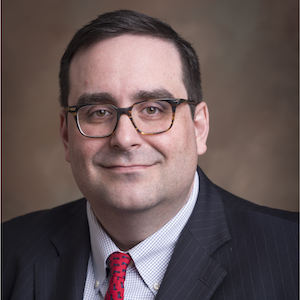 When John Brothers joined T. Rowe Price Foundation as President in 2015, the Foundation’s home in Baltimore was in the midst of social unrest following the tragic murder of Freddie Gray, a 25-year old Black man arrested over his legal possession of a knife and sustained injuries while being transported by the Baltimore Police. The T. Rowe Price Foundation recognized that it was a critical time to pause and listen to the Baltimore community. Within months of joining the Foundation, John Brothers and the Foundation team began an ongoing dialogue within Baltimore – in homes, places of worship, and community spaces. By leaning into the expertise and experience of community partners, John developed the T. Rowe Price’s Theory of Philanthropy, which mirrors principles to those similar to Trust-Based Philanthropy.
When John Brothers joined T. Rowe Price Foundation as President in 2015, the Foundation’s home in Baltimore was in the midst of social unrest following the tragic murder of Freddie Gray, a 25-year old Black man arrested over his legal possession of a knife and sustained injuries while being transported by the Baltimore Police. The T. Rowe Price Foundation recognized that it was a critical time to pause and listen to the Baltimore community. Within months of joining the Foundation, John Brothers and the Foundation team began an ongoing dialogue within Baltimore – in homes, places of worship, and community spaces. By leaning into the expertise and experience of community partners, John developed the T. Rowe Price’s Theory of Philanthropy, which mirrors principles to those similar to Trust-Based Philanthropy.
T. Rowe Price’s Theory of Philanthropy centers long-term impact by strategic investments in areas identified in partnership by those who live and work within the Baltimore community. The Foundation and community partners co-define a vision for success and community partners are trusted with the agency to make decisions in pursuit of shared goals. T. Rowe Price’s Theory of Philanthropy is considered a distinct model among other large corporate foundations. When asked how John managed to gain board consensus on this novel approach, he characterized the Theory of Philanthropy with a business metaphor: “People don’t buy stocks for an iPhone – they invest in Apple.” The Foundation focuses on supporting nonprofit organizations in a holistic way. By listening to the community early on, John shifted the Foundation’s approach from funding a variety of important, yet disconnected, programs to a co-creating strategic investment of capital and other support on more focused efforts that will have a lasting impact. To learn more please visit troweprice.com/foundation.
Doing Good Better, a partnership of the Council of New Jersey Grantmakers and the New Jersey Center for Nonprofits, is a community of funders and nonprofits taking action against the power imbalances and racial inequities in philanthropy, nonprofits, and government.
How the government can partner with impact investors to unleash new capital, talent and energy for maximum impact.
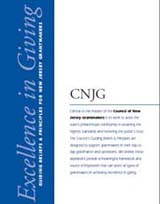
This includes insights and tips related to board governance, legal compliance, grantee communications, fiscal responsibility, public disclosure, and many other key areas of foundation governance and operations. It is intended to serve as a practical resource to assist foundations in their grantmaking.
At a recent Ocean & Monmouth Funders Roundtable, the group discussed all of the different databases and lists of nonprofits available to philanthropy to be able to research new and different nonprofits.
